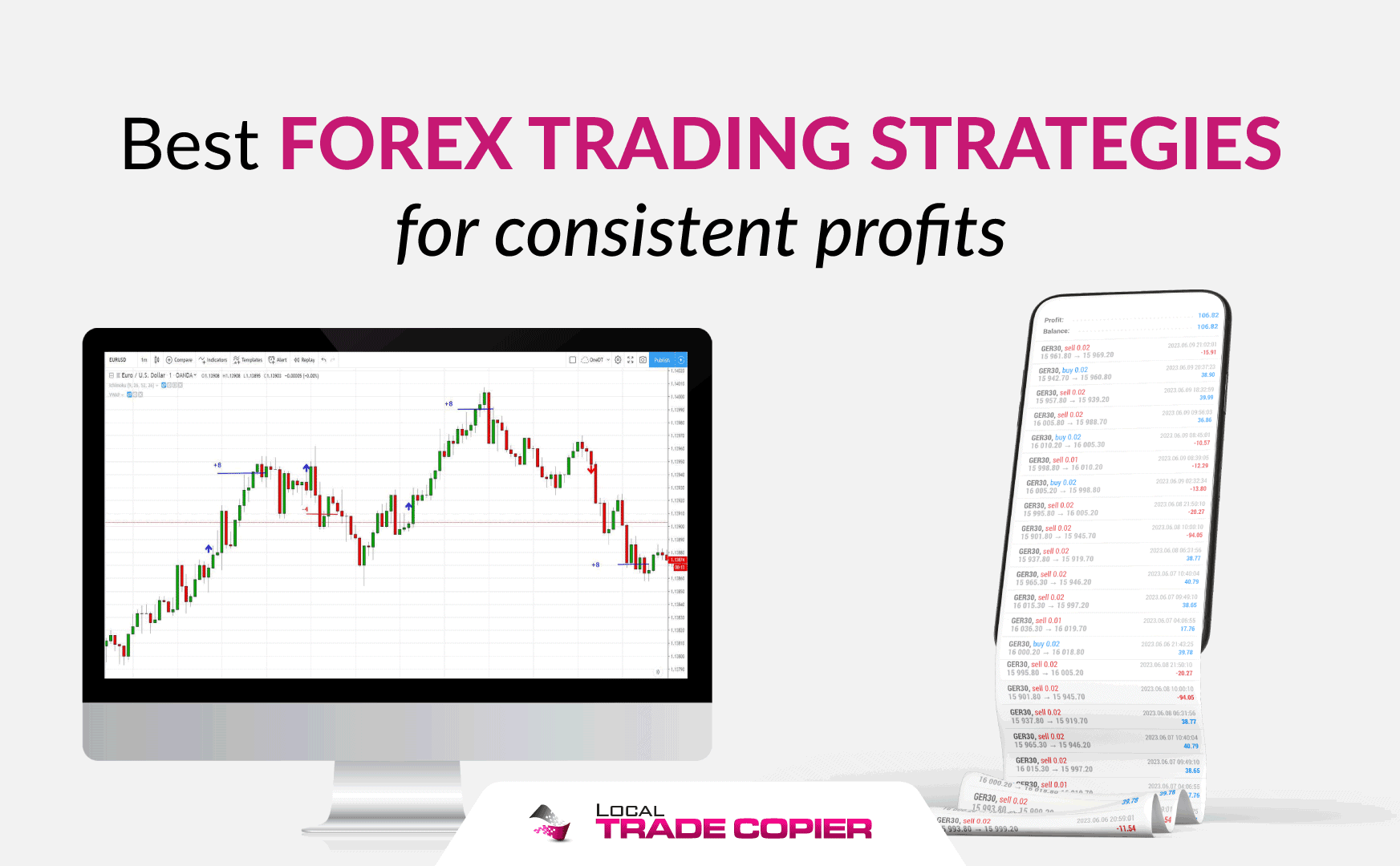
Proven MT4 Copy Trading Methods for Steady Forex Gains: The Ultimate Guide

Proven MT4 Copy Trading Methods for Steady Forex Gains: The Ultimate Guide

Forex trading, the largest and most liquid financial market globally, offers vast opportunities for traders to profit. However, achieving success in forex requires more than luck; it demands a sound trading strategy. In this article, we will explore some of the best forex trading strategies for consistent profits.
Table of Contents
- Understanding Forex Trading
- The Basics of Forex Trading
- Importance of Forex Trading Strategies
- Top Forex Trading Strategies for Consistent Profits
- Analyzing Market Trends and Indicators
- Risk Management in Forex Trading
- Emotions and Psychology in Forex Trading
- Automating Forex Trading Strategies
- The Future of Trading
- Conclusion
- FAQs
Disclaimer: This post includes affiliate links
If you click on a link and make a purchase, I may receive a commission at no extra cost to you.
Understanding Forex Trading
Forex trading , short for foreign exchange trading, involves buying and selling currencies against each other in the foreign exchange market. Traders speculate on whether a currency will appreciate or depreciate in value relative to another currency.
The Basics of Forex Trading
Currency pairs are traded in the forex market, where the first currency is the base currency, and the second currency is the quote currency. The exchange rate represents the value of the base currency relative to the quote currency.
Importance of Forex Trading Strategies
The forex market’s high volatility demands a well-defined trading strategy to navigate the rapid fluctuations successfully. A strategy helps traders make informed decisions, manage risks, and improve the overall chances of profitability.
Top Forex Trading Strategies for Consistent Profits
1. Scalping Strategy
Scalping involves making rapid trades to profit from small price movements. Traders executing scalping strategies hold positions for a short time, sometimes just seconds or minutes, aiming to accumulate many small gains.
2. Day Trading Strategy
Day trading involves opening and closing positions within the same trading day. Day traders carefully analyze market trends and indicators to make quick decisions. Positions are usually closed before the market closes to avoid overnight risks.
3. Swing Trading Strategy
Swing trading involves holding positions for a few days to several weeks. Traders seek to capitalize on short- to medium-term price movements and trends.
4. Position Trading Strategy
Position traders hold positions for an extended period, often months or years. They aim to profit from long-term market trends.
5. Trend Following Strategy
Trend following traders identify and follow prevailing market trends. They enter long positions in uptrends and short positions in downtrends.
6. Breakout Strategy
Breakout traders focus on currency pairs experiencing price volatility. They aim to enter positions when the price breaks above or below significant support or resistance levels.
7. Carry Trade Strategy
Carry traders take advantage of interest rate differentials between currency pairs. They go long on a currency with a higher interest rate and short on a currency with a lower interest rate.
8. Diversified Portfolio Strategy
Diversification involves spreading investments across different currency pairs and instruments to reduce risk exposure.
9. Price Action Trading Strategy
Price action traders base their decisions on the analysis of raw price movements, chart patterns, and candlestick formations.
10. Range Trading Strategy
Range traders identify periods of consolidation in the market and trade within the established price range.
Analyzing Market Trends and Indicators
Technical Analysis
Technical analysis involves studying historical price charts and using various indicators to predict future price movements.
Fundamental Analysis
Fundamental analysis focuses on economic, political, and social factors that can influence currency prices.
Risk Management in Forex Trading
Importance of Risk Management
Risk management is vital in forex trading as it acts as a safety net, protecting traders from potential financial disasters. It involves setting parameters like stop-loss and take-profit levels to limit losses and managing position sizes to prevent overexposure. With risk management, traders can navigate the unpredictable forex market with confidence and safeguard their capital and emotional well-being.
Setting Stop-Loss and Take-Profit Levels
Setting stop-loss and take-profit levels is crucial in forex trading to limit potential losses and secure profits. Stop-loss orders automatically close a trade when it reaches a predefined loss level, while take-profit orders do the same when a predefined profit level is reached, helping traders make disciplined decisions and protect their capital.
Managing Position Sizes
Managing position sizes in forex trading is akin to balancing on a tightrope – finding the right equilibrium between risk and reward. By carefully determining how much of your capital to allocate per trade, you can safeguard against significant losses and optimize potential gains. It’s a delicate dance that ensures traders can navigate the market with confidence and precision, staying on track towards consistent profitability.
Emotions and Psychology in Forex Trading
Controlling Emotions
Controlling emotions in forex trading is like taming a wild horse – it requires discipline and focus. Emotions like fear and greed can cloud judgment, leading to impulsive decisions and potential losses. By staying calm, sticking to a trading plan, and avoiding emotional rollercoasters, traders can steer their way to more rational and successful trading outcomes.
Staying Disciplined
Staying disciplined in forex trading is like staying on course during a storm – it keeps you steady amidst market turbulence. By adhering to your trading strategy, resisting temptations to deviate, and maintaining a consistent approach, you can avoid impulsive decisions and trade with a clear and focused mindset, increasing the likelihood of achieving profitable results.
Developing a Trading Plan
Developing a trading plan is like charting a roadmap before embarking on a journey. It involves setting clear goals, defining strategies, and establishing risk management rules. A well-crafted trading plan keeps traders organized, focused, and prepared for the dynamic forex market, enhancing their chances of success in the exciting world of trading.
Automating Forex Trading Strategies
Automating forex trading strategies is like having a reliable co-pilot that executes trades on your behalf. It involves using trading algorithms and software to enter and exit positions based on predefined criteria. By automating strategies, traders can remove emotions from the equation, achieve faster execution, and potentially capitalize on market opportunities 24/7, allowing them to explore new horizons in the ever-evolving world of forex trading.
The Future of Trading
The future of trading is akin to a technological adventure, where innovation and automation will redefine the landscape. With advancements in artificial intelligence and blockchain, trading is becoming more accessible and efficient. Traders can expect enhanced algorithms, smarter trading bots, and seamless integration of decentralized finance, paving the way for exciting possibilities in the ever-evolving financial markets.
Conclusion
Successful forex trading requires a combination of a well-thought-out strategy, effective risk management, and emotional discipline. Traders must choose a strategy that aligns with their trading style and risk tolerance. By staying informed and adapting to market conditions, traders can position themselves for consistent profits in the dynamic world of forex trading.
FAQs
1. Is forex trading suitable for beginners?
Ans. Yes, forex trading can be challenging for beginners, but with proper education and practice, newcomers can gradually become proficient traders.
2. Which forex strategy is the best?
Ans. There is no one-size-fits-all strategy. The best strategy depends on an individual’s trading goals, risk appetite, and time commitment.
3. Are automated trading systems reliable?
Ans. Automated trading systems can be effective if properly designed and tested. However, there are no guarantees of success, and human oversight is still essential.
4. What are the risks of forex trading?
Ans. Forex trading involves significant risks, including market volatility, leverage, and geopolitical events that can impact currency values.
5. Can emotions affect forex trading decisions?
Ans. Emotions, such as fear and greed, can lead to impulsive decisions and potentially negative outcomes in forex trading.
Related posts:
- Most Effective Strategies for Managing Risk in Forex Trading
- 10 Forex Trading Strategies Based on Economic Indicators
- Top 13 Mistakes That Forex Traders Should Avoid
- The Importance of Fundamental Analysis in Forex Trading
Also read:
- [New] Virtual Vice-Versa 10 Alternative Action Games
- [Updated] Hushing Up Unwanted Noise on Skype for 2024
- [Updated] In 2024, Innovating with Ideas Constructing Your Unique TikTok Sequence
- Easy & Secure Portable Disk Erasure Tool - Quick Guide
- Fast-Track Solutions: Resolve Slow iPhone Setup in Minutes
- How To Recover From a Crash in Your Radeon Wattman Configurations Successfully
- In 2024, Downloading SamFw FRP Tool 3.0 for Xiaomi Redmi Note 12 4G
- L'Art De La Restauration Des Cartes CF Difficultés D'Identification : Votre Solution Definitive en Six Pratiques Essentielles
- The Most Effective ADATA Backup Solutions for Optimal Data Protection
- Title: Proven MT4 Copy Trading Methods for Steady Forex Gains: The Ultimate Guide
- Author: Stephen
- Created at : 2024-10-17 09:22:27
- Updated at : 2024-10-20 03:12:01
- Link: https://win-extraordinary.techidaily.com/proven-mt4-copy-trading-methods-for-steady-forex-gains-the-ultimate-guide/
- License: This work is licensed under CC BY-NC-SA 4.0.